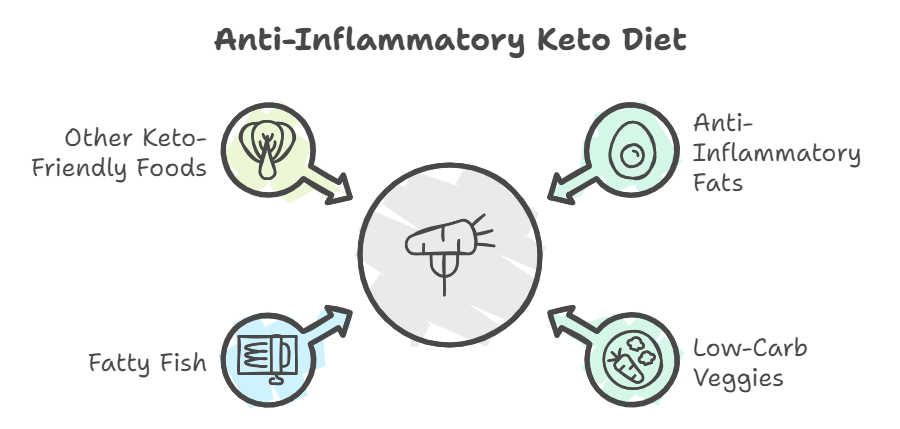You hear it everywhere you turn—combating inflammation is the key to better health. But with so much information floating around, figuring out where to start can make your head spin. That’s where the keto anti inflammatory diet comes in.
Keto anti inflammatory diet may be your ticket to feeling your best. Plus, we’ll delve into the science behind this powerful combination.
Now, if you’re thinking “Another diet?”—hold on. The keto anti inflammatory diet is less about restrictions. It’s more about making smart choices that work with your body, not against it. So, buckle up (not literally). Get ready to uncover the tasty world of a keto anti-inflammatory diet.
What is a Keto Anti Inflammatory Diet?
The keto anti inflammatory diet is a two-pronged approach. It uses a ketogenic diet to lower mild inflammation. It also adds anti-inflammatory foods.
Let’s dissect each element to gain a deeper understanding of their synergy. First off, we’ve got the keto anti inflammatory diet.
This diet aims to cut carbs. It forces your body to use fat, not glucose, for fuel. This metabolic process is called ketosis.
Why is this switch-up important for fighting inflammation? Research indicates that ketones (those fat-burning byproducts) might own remarkable anti-inflammatory properties. It’s like swapping gasoline for a cleaner fuel source, but for your metabolism.
Now, where do anti-inflammatory foods fit into the picture? They become the superstars of your plate. These superfoods are full of antioxidants and other good compounds. They help reduce inflammation naturally.
We need healthy inflammation. Some is vital for healing.
This approach is more like a lifestyle change. It’s sustainable and supports your well-being. Think of it as a delicious way to potentially reduce the risk of chronic diseases. And who wouldn’t want that?
How Does the Keto Diet Potentially Reduce Inflammation?
You might be surprised. The ketogenic diet may reduce inflammation, too. It may aid weight loss.
It’s not magic, but it does have to do with ketones1, the special molecules produced during ketosis. Ketones can affect the gut microbiome. They promote beneficial gut bacteria.
Ketones and The NLRP3 Inflammasome
Ketones can interact with a specific inflammatory pathway in your body. It’s called the NLRP3 inflammasome. This pathway is like a fire alarm system in your body. When triggered, it sets off a cascade of inflammation.
Some researchers believe the keto anti inflammatory diet could calm the immune system. This might help reduce inflammation and prevent chronic inflammatory diseases.
And when the body keeps inflammation at bay, it can potentially operate more optimally. Some studies show that ketones may also reduce brain inflammation2, which is linked to conditions like Alzheimer’s and Parkinson’s disease.
“An anti-inflammatory diet can be a powerful tool to reduce symptoms and improve quality of life.”
Dr. Will Cole
Shifting from Glucose to Ketones: A Metabolic Makeover
On a standard Western diet that’s heavy on refined carbs and sugar, your body relies heavily on glucose for fuel.
This sugar rush can cause spikes and crashes in your blood sugar. It often leads to increased inflammation and other unpleasant symptoms.
The keto anti inflammatory diet emerges as a game-changing solution. Reducing carbs a lot shifts your body to burning fat for fuel. This encourages your liver to produce ketones.
Replacing some of your protein sources with healthy fats can help your body get into ketosis.
As you continue, your body becomes very efficient at using these ketones.
And, since ketones may reduce inflammation, they are like a finely-tuned, high-performance machine. Switching to them is like swapping an old, sputtering engine.
Foods to Embrace on a Keto Anti Inflammatory Diet
To simplify your journey, I’ve made a list of foods to add to your keto anti inflammatory diet. Embrace these dietary staples to fuel your body with inflammation-fighting powerhouses:

Anti-Inflammatory Fats:
- Avocado: Rich in monounsaturated fats, fiber, and antioxidants. One small study associated a daily serving of avocado to improved heart health.
- Keto serving size: 1/2 avocado.
- Olive Oil: It’s high in oleic acid, a heart-healthy fat. It may reduce inflammation.
- Keto serving size: 1-2 tablespoons.
- Coconut Oil: It has medium-chain triglycerides (MCTs). They may help fight inflammation.
- Keto serving size: 1-2 tablespoons.
- Nuts and Seeds: Walnuts, flaxseeds, chia seeds, and almonds are rich in omega-3 fatty acids. Research suggests these seeds can protect against inflammatory conditions.
- Keto serving size: 1/4 cup.
Low-Carb Veggies
Load up your plate with these vibrant, nutrient-dense vegetables that boast anti-inflammatory prowess:
- Leafy greens like spinach and kale.
- Broccoli.
- Cauliflower.
- Asparagus.
- Brussels sprouts.
- Bell Peppers.
Fatty Fish: Your Omega-3 Powerhouse
Omega-3 fatty acids deserve their own category— they’re truly remarkable when it comes to tackling inflammation.
These powerful compounds work to balance out omega-6 fatty acids3. But, there’s a catch. The standard American diet often causes too many omega-6s and not enough omega-3s.
That’s where fatty fish come in. A 3-ounce serving of salmon packs 1921 mg of omega-3s. That’s more than enough to fight pro-inflammatory omega-6s. Salmon isn’t your only option though. You’ve also got:
- Mackerel.
- Tuna.
- Sardines.
Other Keto-Friendly Foods:
- Grass-Fed Beef: Look for cuts higher in omega-3 fatty acids compared to grain-fed beef.
- Eggs: A protein-packed choice that might actually protect against inflammation.
- Green Tea: It has catechins, especially EGCG. They may reduce inflammation.
- Spices: Use turmeric and ginger for flavor and to fight inflammation.
- Over the past twenty years, more than 6,000 studies have showcased the advantages of turmeric curcumin4 – the active compound in this spice. Research reveals this component’s capacity to reduce inflammation substantially.
- For even better results, pair your turmeric with some black pepper. Research shows that black pepper boosts turmeric’s impact by 154%. A compound in black pepper, piperine, causes this effect. This simple spice combo could be a game changer. It could maximize flavor and boost the anti-inflammatory effects of your keto anti inflammatory diet.
A Glimpse into a Keto Anti Inflammatory Meal Plan
Now that you know the what, let’s explore the how with a sample keto anti inflammatory diet meal plan. Just a heads-up, this is just a taste. It’s key to consult a registered dietitian for a plan tailored to your needs and goals.
| Day | Breakfast | Lunch | Dinner | Snacks |
|---|---|---|---|---|
| 1 | Scrambled Eggs with Spinach and Avocado | Salmon with Roasted Asparagus and a drizzle of olive oil | Chicken Stir-Fry with Cauliflower Rice | A handful of Walnuts |
| 2 | Keto Smoothie with Spinach, Avocado and Coconut Milk | Leftover Chicken Stir-Fry | Grass-fed Beef and Broccoli | Green Tea |
Understanding the Potential Benefits of a Keto Anti Inflammatory Diet
A keto anti inflammatory diet isn’t a magic cure. Wouldn’t that be nice? But, it may help reduce chronic inflammation and associated diseases5. Researchers have linked chronic inflammation to a range of health problems such as:
- Heart disease.
- Certain types of Cancer.
- Autoimmune Conditions.
- Obesity.
- Type 2 Diabetes.
When you restrict carbs, your body enters ketosis. This is a metabolic state where your body starts burning fat for fuel instead of glucose.
Studies show this metabolic switch can have a positive impact on inflammation levels. Also, many keto-friendly foods, like fatty fish and olive oil, are high in antioxidants. They can help reduce oxidative stress.
Frequently Asked Questions
Does a keto diet reduce inflammation?
Research shows that ketones may reduce inflammation. So, the ketogenic diet may lower it. Research shows ketones can reduce inflammation. They affect certain cells and signaling pathways that usually cause it.
Always speak with a healthcare professional before starting a new diet, especially if you have health issues.
Which diet is most anti-inflammatory?
There isn’t a magic anti-inflammatory diet. Diets rich in fruits, vegetables, whole grains, legumes, nuts, seeds, and fish high in Omega-3’s (like salmon and mackerel) often get high praise. So do healthy fats, like those in olive oil and avocados.
What all of these diets share is an emphasis on whole foods and minimizing processed ingredients, sugar, and unhealthy fats.
One example is the Mediterranean diet which research shows lowers CRP, which are markers for inflammation. Research also showed it improved insulin sensitivity in those with type 2 diabetes. The best diet for you depends on your individual health history, preferences, and needs.
Can a low-carb diet be anti-inflammatory?
There’s a common misconception that “low-carb” equals restrictive. This can often lead to deficiencies in important nutrients due to fears about eating the right kinds of carbs. This isn’t about eliminating all carbohydrates.
Low carb diets focus on making smarter choices. They replace refined carbs, like sugary drinks and processed snacks, with nutrient-rich alternatives. It is also about making healthier, less-processed carbs the diet’s foundation.
If you’re looking to incorporate more nutritious options into your low-carb plan, you might find our guide on high-protein and low-carb foods for a healthy diet particularly helpful.
For example, replace white bread with whole-grain options. Replace sugary cereals with high-fiber oatmeal. And, replace fruit juices with whole fruits. Swapping out soybean and corn oils for healthier ones, like avocado or olive oil, can help.
What is the difference between a keto and anti-inflammatory diet?
The keto anti inflammatory diet aims to put your body in ketosis. It encourages burning fat for fuel. Research shows this may reduce inflammation.
An anti-inflammatory diet aims to include more foods with proven anti-inflammatory powers. It also seeks to limit processed foods, unhealthy fats, and added sugars.
A keto anti inflammatory diet combines two approaches. It seeks the benefits of both ketosis and a nutrient-rich diet.
You’ll enjoy lots of foods. They include healthy fats, low-carb veggies (like cauliflower rice and zucchini noodles), fatty fish, and, occasionally, dark chocolate. Remember, brown rice should not be included in a keto anti inflammatory diet.
Conclusion
The keto anti inflammatory diet aimed at reducing inflammation may seem complex, but it all boils down to simple principles: eat foods that fight inflammation and promote better health.
This approach is based on incorporating anti-inflammatory foods into your diet, such as fatty fish, olive oil, avocado, and low-carb vegetables. Reduce or eliminate the consumption of sugar, processed foods, and refined carbohydrates to help decrease inflammation in the body.
Remember, you are not alone on this journey. Small but mindful changes in your diet can help you feel better and maintain your health. This is a powerful method that can positively affect your overall well-being.
As always, it is essential to consult your doctor or dietitian before making any changes to your diet. Experts can help you find the best approach based on your health history and provide advice and recommendations for achieving a balanced state of health.
If you’re considering a keto diet to manage inflammation, start by incorporating one keto-friendly anti-inflammatory food each day—like avocados or salmon—and track how your body feels.
Small Step, Big Impact
To reduce inflammation naturally, try incorporating keto anti inflammatory diet foods like salmon, spinach, and olive oil into your diet. Start with small changes and monitor how your body responds.
Listen to this article
This is an AI generated Podcast version of the article.
- https://my.clevelandclinic.org/health/body/25177-ketones[↩]
- https://www.kevinmd.com/2024/01/ketones-may-be-the-key-to-unlocking-a-healthier-brain.html#:~:text=Ketones%20reduce%20brain%20inflammation%20by,energy%20factories%E2%80%9D%20in%20brain%20cells.[↩]
- https://www.mountsinai.org/health-library/supplement/omega-6-fatty-acids#:~:text=As%20a%20type%20of%20polyunsaturated,and%20omega%2D6%20fatty%20acids.[↩]
- https://www.health.harvard.edu/staying-healthy/turmeric-benefits-a-look-at-the-evidence[↩]
- https://www.ncbi.nlm.nih.gov/pmc/articles/PMC5805548/[↩]



